Lions star reveals traumatic battle with stalker
Brisbane Lions great Mitch Robinson has revealed his terrifying battle with a stalker who threatened him and his family. He has joined Broncos captain Alex Glenn and swimmer Cate Campbell in demading tougher laws to combat cyber bullying.
QWeekend
Don't miss out on the headlines from QWeekend. Followed categories will be added to My News.
A Brisbane Lions star and his family earlier this year faced a late-night death threat from a cyber stalker.
Speaking out in a bid to raise public awareness of the escalating levels of abuse against athletes, veteran midfielder Mitch Robinson, 31, says after growing a thick skin to deal with negative comments over the course of his career, this was above and beyond anything he had experienced before. He went to the police after the stalker left a voicemail saying that if Robinson didn’t reply he and his family would be murdered.
Anthony Seibold uncovers more high-profile names in troll war
Melbourne Storm refer troll threats to NRL Integrity Unit and police
Brisbane Broncos captain Alex Glenn, 32, agrees that this year the cyber abuse against his teammates is the most appalling he has seen at any time of his career. The Red Hill-based rugby league team has endured its worst season on record, which led to the departure of team coach Anthony Seibold, who revealed he and his family had been subjected to vicious social media trolling. He subsequently made an official police complaint in a bid to punish those involved.
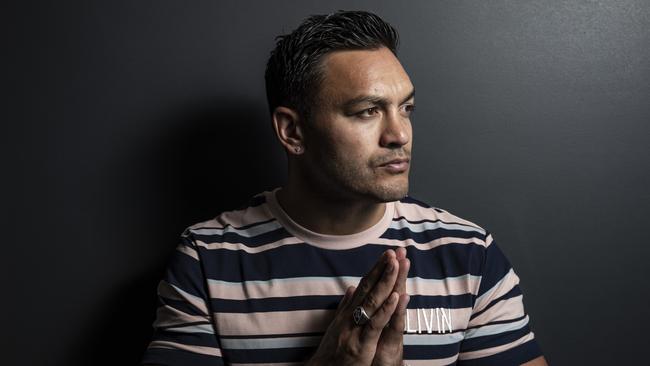
Glenn says that when he read a particular string of comments aimed at his teammates aged in their teens and early 20s, telling them to kill themselves, he knew he had to do more publicly to try to bring this sort of vitriol to an end.
Decorated Brisbane swimmer Cate Campbell also saw the flip side of success when she unexpectedly lost the 100-metre freestyle final at the 2016 Rio Olympic Games and experienced extreme online trolling.
Robinson wants laws beefed up to punish trolls. He is not alone in this call, with Seibold making the same appeal, and Glenn and Campbell backing his move.
“Firstly, there should be authentication rules around starting an account,” Robinson says.
“You should have to provide some ID and have your address and number so police can track this. At the moment, it’s just an endless pit where people can create one account and once it’s banned, create another.
“They also have to put more resources into it. When I had my case, it was a strenuous effort to get the cop shop and lodge a complaint and harder for me to charge this person because he lived in Perth.
“It’s a form of abuse and if you did this in public, well firstly, the person wouldn’t do it in public because there’s no computer screen between them and their victim, but secondly you’d be getting fined or arrested.
“The police can do better with this.”
Glenn and Campbell agree but are unsure how something like this can be policed.
“It’s so easy to make fake pages but I’d love to see some people be held accountable for their hurtful comments,” Glenn says.
“If it comes down to a point where someone did take their lives from someone’s comments, how would you feel?
“We shouldn’t have to wait until it gets to that point. I’d love to start making people accountable for their actions now.”
“I wonder if it’s the lack of regulation and the lack of consequences surrounding trolling that makes them bold,” Campbell agrees.
“People who are sitting on the fringe, on the outskirts, thinking nothing has happened to them so if you can’t beat them, join them.
“But it’s abuse. Let’s be real. Just because it’s hard to police, doesn’t mean we shouldn’t try it. Social media is going to be with us for a long time and people need to be protected on it and feel safe.”
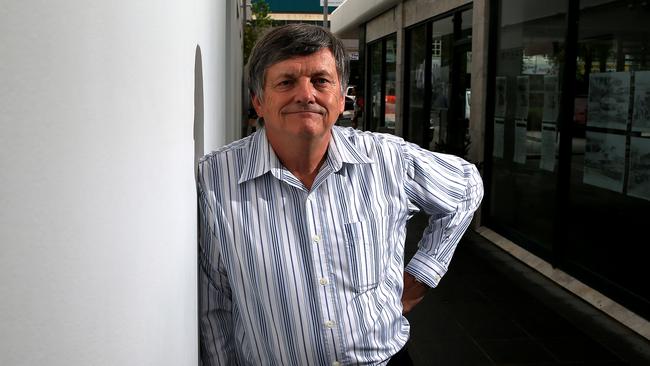
Performance psychologist Dr Phil Jauncey, who has worked with the Brisbane Broncos, Queensland Maroons, Brisbane Lions and the Australian Olympic team, says cyberbullies lash out at and target famous sportspeople on social media platforms to win reaction and to bring athletes down to “their level”.
“In a sense, it’s a backhanded compliment if someone bullies you,” he says.
“Either they think the person they’re bullying is better than them and want to bring them down to their level or their own life sucks and they want to bring people down to their level of unhappiness.
“One of the key things people have to realise is, it’s not about them. It’s about the bully.
“If I’m really angry and don’t like somebody, it’s not easy for me to tell them that face-to-face. But if I can get on my phone, send a message and it’s anonymous, it’s really easy.”
Dr Jauncey says the other reason is often to get a reaction or an acknowledgment from someone who is famous or succeeds in their field, such as athletes.
During his time with the Lions, he says he would walk around the sideline with players after they had come off during a match and noticed the different ways in which they would react to crowd abuse.
“One of the players I was with, one of the fans said something really bad to him and he yelled at back the fan,” he says.
“I said, ‘you’ve just made his day’.
“Another player, Brad Scott, he had a fan yell at him one night and he just smiled at me. He wasn’t going to respond and make that guy’s day.
“These people are insecure and are hoping they can find something bad enough to get the important person to respond.”
He says for athletes, they have two choices. They can either not read social media comments or, if they do, take a three-pronged approach.
He says if they read something that makes them unhappy, they have to ask:
Is it true and if so, can I do anything about it? If yes, then do something about it.
Is it true and if so, can I do anything about it? If not, then acknowledge it’s out of your control.
If it’s not true, if it’s a falsehood, then “don’t ever let yourself be determined by what other people think you are”.
“If people are giving us falsehoods, it’s their problem,” he says.
“It’s not something we have to get upset about. You have to keep it in perspective. You need to have a reference.
“If I’m just reading social media comments and not talking to a mentor who can put that in perspective, that can be difficult.
“We need to find somebody we trust – a coach, psychologist or friend – and say, ‘I know this is garbage, but I need to talk it out’.
“It comes back to perspective.”
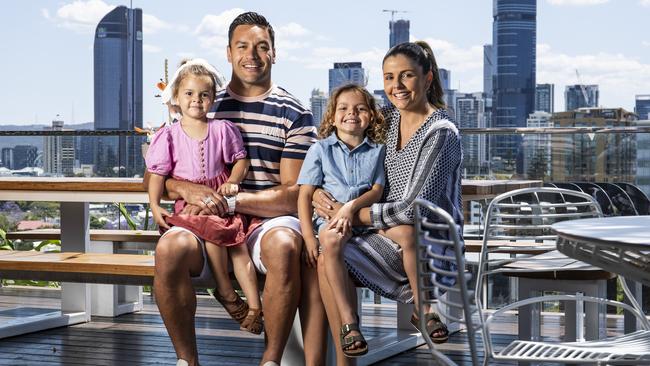
Alex Glenn still remembers the sickening feeling that hit his gut when his fiancee Jemma-Lee Morgan showed him a string of comments on social media after one of Brisbane’s losses this year.
The Broncos skipper was hurting from yet another defeat, with the club managing just three wins from 20 games in season 2020.
Social media abuse had sadly become the norm for Brisbane’s playing group, but what lay before Glenn’s eyes on this particular day was a new low.
“I don’t really go through comments on social media after a game but my missus picked this one up and she showed me what they were saying about my players and my team,” Glenn says of Facebook trolls.
“It’s never nice to read but these comments were telling players to harm themselves and commit suicide.
“That’s where I drew the line in the sand.”
An 11-year veteran of the NRL, Glenn himself has never been the victim of such vile and hurtful messages.
He has copped plenty of abuse, especially this season, but never has he been told to go and kill himself.
Glenn says when he read those messages – aimed at his teammates aged in their teens and early 20s – he knew he had to do more publicly to try to bring this sort of vitriol to an end.
“I don’t want to anyone to go to any extreme extent to hurt themselves,” he says.
“When I saw those comments, I just prayed they got taken away before the player or their family saw it.
“I’ve just had enough. It’s easy for someone to write that stuff without any knowledge of what might happen.
“But it can have a huge toll on people’s mental health and it only takes someone that’s not mentally stable to rethink something like that and to actually do harm to themselves.
“That’s the last thing I would want to see happen on my hands or hear about in the sports industry.”
Season 2020 was Glenn’s first as captain of the Broncos.
It was also the most challenging year he’s had to endure on the field.
Not only was he plagued by injury, but the Broncos claimed their first wooden spoon, came under immense pressure from critics, fans and trolls alike, and had to watch as coach Anthony Seibold became the target of a social media smear campaign, just weeks before he stepped down from his role.
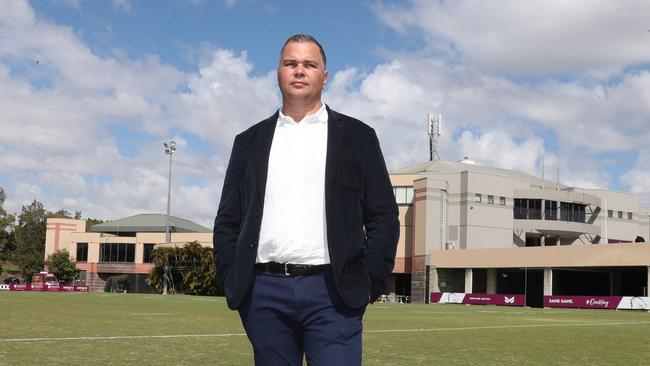
Glenn says throughout his career he’s managed to avoid much online criticism, but this season he was receiving abusive messages on a weekly basis.
“Fans do hurt but we don’t go out there to intentionally lose and cop criticism to that extent,” the 32-year-old says.
“Tell me an industry or workplace where you get criticised or judged on a daily basis like we do … I don’t think there’s another job out there like it.
“Yeah, you get paid good money and it comes with the territory. But the pressure and criticism and challenges you face on a daily basis, it’s extreme.
“With (Seibold), I didn’t see any of what was said about him and he didn’t really give me any details, but I have a good relationship with him.
“Out of everything, what hurt him most was that people were attacking his family, his wife and kids.
“They have no control over it and have no influence on how the team is performing or playing. I just felt so sorry for him. It’s a tough industry but it shouldn’t take a huge toll on the family.
“When I see that someone is going through tough times, I immediately put myself in that situation and think how would I feel if that was me or my family.
“It wouldn’t sit well with anyone. The hardest thing was there was really nothing I could do apart from the way we performed on the field. We were trying so hard to get the wins but there was nothing else we could have done to help Seibs and his family.
“You just feel pretty helpless.”
And it is with his own family where Glenn finds his peace away from the field.
While he is passionate about bringing an end to social media trolling and cyber-bullying, Glenn does everything he can to keep away from the abusive messages.
He has been with his partner Jemma-Lee Morgan since 2010 and they have two beautiful children, Miller, 4, and Gisele, 3, with their third child due next year.
And they are his “reason why”.
“The best thing for me was my kids,” he says.
“They really help you switch off from everything. They don’t care if you’re having a bad day or a good day. When you get home, they just want a cuddle, a play and your attention.
“That’s really helped this year. They’ve helped me deal with the pressures and switched my mind off.
“In my earlier years, when you have a tough loss or get pumped or have a bad game, it ruins your week. You don’t want to show your face in public.
“You expect so much from yourself and you don’t want to be happy.
“But you learn as you go.”
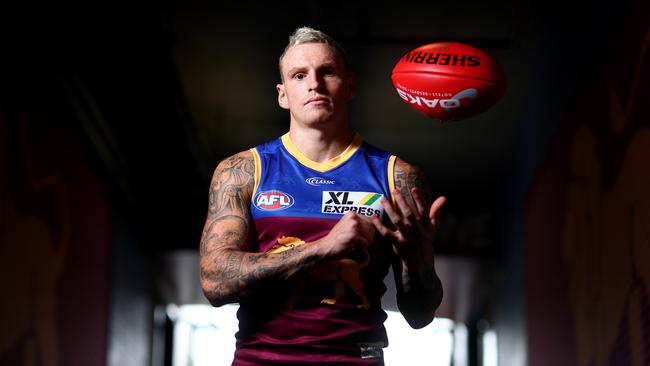
Brisbane Lions veteran Mitch Robinson is usually one to dismiss social media trolls and cyberbullies.
He believes that by giving them attention, you just fuel their desire to be noticed.
But earlier this year, Robinson was forced to take action after an online gaming hacker from Perth became his stalker, relentlessly targeting the 31-year-old for three straight months.
While the Lions enforcer was able to ignore the threats and ongoing attempts at contact for a while, it was a chilling message left on his phone in the middle of the night that left him furious and seeking action.
“I do a lot of online gaming and apparently he’s a bit of a hacker and he got my mobile number through some program,” Robinson says of his stalker.
“It started in March and went on for about three months. It was just random phone calls … he kept calling me at all hours and he would leave voicemails.
“I didn’t care too much about it but the last voicemail he left was the turning point.
“He left a voicemail that if I didn’t reply then he would murder me and my family.
“I have grown a thick skin over my career but when you mention families, it goes too far.
“I didn’t really tell anyone about it until it got to that point. I told (my partner) Emma (MacNeill) not to be alarmed and that we would sort it out.”
Robinson – a father of Chance, 6, and Charli, 4 – went to his local police station but didn’t take further action due to the lengthy process it would involve given the man lived in Western Australia.
He also spoke to the Brisbane Lions and the AFL and eventually let the man know he had gone to the police.
The phone calls stopped immediately.
But Robinson hasn’t forgotten the anger he felt when he heard that message.
“I don’t know why people have this mentality,” he says.
“I wanted to handle it myself but I thought if I did it the proper way, it was the best way. I went through the club and I went to the police station and they put it in their system.
“It was handled very professionally. That’s the first time I’ve taken it to that degree.
“I was more angry than anything … all I could wonder was why someone would say that. I’ve heard it all – ‘you’re a dickhead, ugly, a flog, you should go kill yourself’.
“It ranges from so many things. But, what goes through someone’s mind to think that’s okay?
“I watch sport myself and there’s never been a time where I thought I am that angry to send an abusive Instagram message.
“I can’t understand it.”
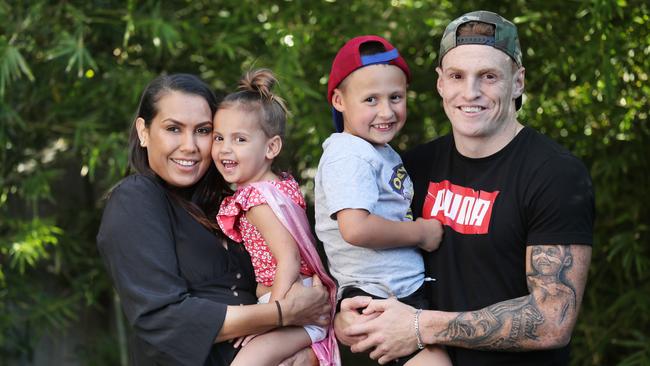
Robinson, who has been a key figure in Brisbane’s resurgence over the past two years, says he was late to join social media and even when he initially signed up to Instagram and Twitter in 2011, he flew under the radar, managing to avoid attacks from trolls.
He said it wasn’t until the Lions actually started finding more success last year and this season that the abuse started.
Even though they were winning, Robinson and his teammates were being targeted and a lot of it had to do with gambling.
“This year was a massive year in terms of the betting,” he says.
“It’s crazy. We get death threats. It happens to all the players in my team.
“You get these constant messages that say things like, ‘you’re shit, you cost me money’. Some of them are $2 bets and it doesn’t mean anything to them but it’s still a reason for them to belittle you.
“It’s a lot. It can be bets like anytime goal scorer to first goal scorer to 15 touches a game. The messages will be more personal because they think it’s easy to do these things.
“But we don’t care about possessions or goals as long as we’re winning.”
Robinson says he used to reply to some trolls or call them out publicly, but has learnt that is the attention they crave.
He says as soon as he realised they want a reaction from the athletes they target, he stepped back and now passes on that knowledge to younger teammates.
“You can’t give them what they want,” he says.
“They want that reaction to show their friends. I know a few players call it out but I find it easiest to let it go now. I do question why they do it and get angry but when you move on, it’s fine.”
What Robinson does want to see though is a change in laws to bring tougher punishments to social media trolls.
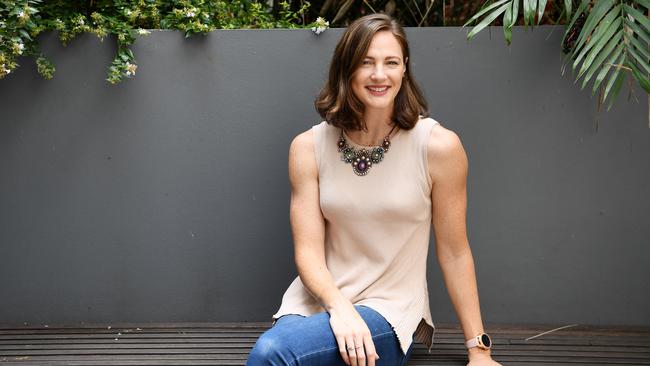
At the 2016 Rio Olympic Games, Australia’s golden girl Cate Campbell was carrying the weight of the nation’s expectations on her shoulders.
She was widely tipped to walk away with the gold medal but finished sixth in her pet event, the 100m freestyle.
She followed up that performance with a fifth-place finish in the 50m freestyle.
Campbell was one of the first to label it “possibly the greatest choke in Olympic history” but what the Queenslander did not expect was the way in which her own fears about her performance were then amplified back at her over social media.
Back in 2016, the attacks that Campbell copped in the fallout from the Olympic Games were some of the most shocking a sportsperson had experienced at the time.
Four years on, not much has changed for Australia’s athletes.
In fact, Campbell believes it’s worse.
“It seems at the moment people are looking for reasons to be outraged,” Campbell says of trolls on social media in 2020.
“If they find anything to be even remotely outrageous then they are willing to jump on it.
“There are obviously more people on social media these days and the numbers are growing so therefore it stands to reason that there are going to be more trolls.”
Campbell herself has not experienced the same intense criticism as she did after the 2016 Olympics.
But she can easily recall how difficult it was to endure that abuse and how it has changed her social media use over the years.
“The first time I experienced it really badly was following those Olympics,” she says.
“You’re at your most vulnerable. You’re in a weakened state and susceptible to a lot of things. That’s when trolls can be particularly vicious.
“Trolls seem to pick at things you’re already afraid deep down people are saying about you. You’re looking at those words in black and white text and your worst fears are confirmed in a way.
“It stabs you right in the heart. I remember being completely overwhelmed. I wanted to switch it off but I also wanted to get rid of it.
“I didn’t want other people to see what everyone was saying about me because it creates a pile-on effect and it gets progressively worse and it snowballs.”
Campbell’s management jumped onto her Facebook and Instagram to monitor and delete comments when it was needed after the 2016 Olympics.
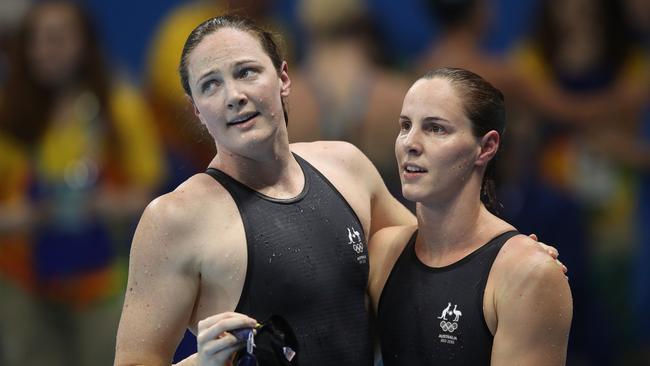
She says she still gets isolated attacks today, especially when she posts about competing at an event.
“You’re going to choke,” the trolls will write. “Why do you even bother? You can’t perform.”
But she knows the Olympics will definitely bring about the most attention and so, before COVID-19 forced the 2020 Tokyo Olympics to be delayed, the 28-year-old had a plan in place to avoid similar attacks to those from 2016.
“I had a very strict social media plan in place,” she says.
“I was going to log out of all my accounts. If I did want to post anything, I was just going to hand over the login details to someone I really trust.
“I was going to get them to still put up my photos and captions, whether it be for sponsorship or just to interact with my fans from inside the village.
“It would still be me talking but I wouldn’t be able to see any blowback.”
Campbell, who studies media and communications at university, says one retort she often cops when she speaks out about social media trolls and bullying is, “why don’t you just give up social media?”.
But, while it’s a simple statement to make, it’s not the reality for a lot of athletes.
“It’s almost an essential part of life now,” she says.
“It frustrates me when people say, ‘just don’t look at it’ or ‘don’t buy into it’. That doesn’t fly with me.
“As athletes you have to have social media and be active because that attracts sponsorship. It’s an essential part of athletes being able to earn a living through their sport now.
“I also like to engage with my fans. Apart from that brief period in my life, social media has been a wonderful and supportive place for me.
“I really enjoy that and that I can connect with and inspire young swimmers across Australia. That’s a wonderful and a positive thing.”
If you or anyone you know is experiencing problems, help is available.
Lifeline: 13 11 14
Beyond Blue: 1300 22 4636

